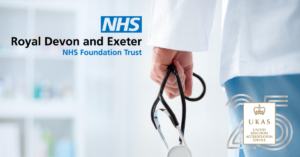4 mins read

RD&E describe the flexible approach that enabled remote assessment to help them through their recent accreditation.
Related topics
Ensuring quality of care with quantity of demand
The Royal Devon and Exeter NHS Foundation Trust (RD&E) provides integrated health and care services across Exeter and East and Mid Devon. With about 8,000 staff, it manages a large acute teaching hospital, twelve community sites and provides acute and community services to a core population of over 460,000.
The Medical Imaging department services patients from GP Surgeries, Hospital Clinics, Inpatient Wards, the Emergency Department and from hospitals across the UK. In any one 24 hour period (weekdays) approximately 500 patients receive diagnostic examinations or treatment in the department.
A whole new approach to assessment
The department has been part of the QSI (formally ISAS) accreditation scheme for 6 years and this was the 2nd year assessment of the 4-year cycle. This year the RD&E was due for an onsite visit, but during February received email notification that due to the outbreak of COVID-19 this would now be carried out virtually using Microsoft Teams. This seemed a little daunting at first, but shortly after the departments face to face meetings were stopped and replaced with Microsoft team meets, this seemingly alien way of meeting was soon adapted and has now become part of everyday working life. The thought of the online assessment was now less daunting!
The department submitted the assessment in the usual way with no changes required. The online assessment was carried out approximately one month later on the original assessment date.
This was certainly very different to having an onsite visit, however, all staff were still invited to the initial introduction meeting and this was followed by a smaller meeting with the Radiology Services Manager, Quality and Accreditation Co-ordinator, QSI Assessment Manager and QSI Trainee Assessment Manager.
Although the assessment review was over several hours, this was relaxed and flowed well, with any questions easily answered. The RD&E were able to demonstrate the changes that had subsequently been made/introduced to the department following COVID-19 and the team was able to share screens to view documents. The only difference was not being able to demonstrate the physical changes to the department, but the suggestion of being able to upload a video for future submissions, which cannot be seen during the Microsoft Teams assessment, would be a solution.
Succeeding in the face of challenge
Whilst this was a very challenging and difficult time for the department, it was able to carry out the assessment with ease. There were no issues and all participants felt the accreditation has been beneficial in these unprecedented times. The team is delighted to have retained their accreditation status for another year. Everyone involved is proud of their accreditation and it was pleasing to hear the assessors tell the RD&E that they could see the quality of the evidence provided was good, and that they have a sound audit plan in place with high-quality policies and procedures.
The retention of this status represents a significant achievement by the entire team, and could not have been reached without commitment from every area of the service, even more so during the current situation.
Radiology Services Manager Feedback
I am immensely proud of this team and service, and all we have achieved over the past year, and this has come to pass in our readiness to respond to the current critical incident. We are what we repeatedly do. Excellence, then, is a habit not an act!
Conclusion
It was great that UKAS, during these difficult and challenging times, opened up a new way of working, with the flexibility and remote assessment this benefited our department. There is no extra work involved and the assessment team are flexible to work around what suits you. From the RD&E’s experience, they would be open to remote assessments as a future option and would encourage anyone who may be hesitant about applying or submitting, not to worry and take the opportunity to engage in the shaping of the new future of online assessments.
Whilst this was something new and alien to the RD&E, the team was soon able to adapt to the situation and felt it quickly became part of everyday working during these ever-evolving times.